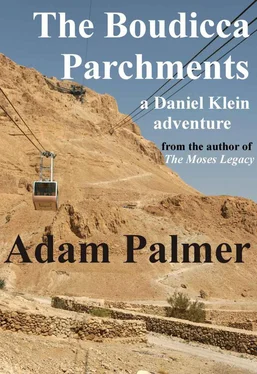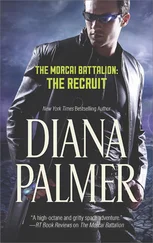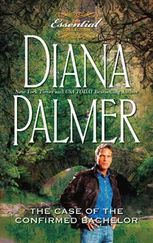Adam Palmer - The Boudicca Parchments
Здесь есть возможность читать онлайн «Adam Palmer - The Boudicca Parchments» весь текст электронной книги совершенно бесплатно (целиком полную версию без сокращений). В некоторых случаях можно слушать аудио, скачать через торрент в формате fb2 и присутствует краткое содержание. Жанр: Прочие приключения, на английском языке. Описание произведения, (предисловие) а так же отзывы посетителей доступны на портале библиотеки ЛибКат.
- Название:The Boudicca Parchments
- Автор:
- Жанр:
- Год:неизвестен
- ISBN:нет данных
- Рейтинг книги:3 / 5. Голосов: 1
-
Избранное:Добавить в избранное
- Отзывы:
-
Ваша оценка:
- 60
- 1
- 2
- 3
- 4
- 5
The Boudicca Parchments: краткое содержание, описание и аннотация
Предлагаем к чтению аннотацию, описание, краткое содержание или предисловие (зависит от того, что написал сам автор книги «The Boudicca Parchments»). Если вы не нашли необходимую информацию о книге — напишите в комментариях, мы постараемся отыскать её.
The Boudicca Parchments — читать онлайн бесплатно полную книгу (весь текст) целиком
Ниже представлен текст книги, разбитый по страницам. Система сохранения места последней прочитанной страницы, позволяет с удобством читать онлайн бесплатно книгу «The Boudicca Parchments», без необходимости каждый раз заново искать на чём Вы остановились. Поставьте закладку, и сможете в любой момент перейти на страницу, на которой закончили чтение.
Интервал:
Закладка:
From where Ted stood, it was hard to see some of the edges of the plateau. It’s shape was rhombic, nearly 1800 feet on its longest axis and half that on its shortest. Although essentially a ruin, parts had been rebuilt, whilst remnants of other parts had been exposed to hip height by archaeology. In one direction stood the reconstructed Northern Palace and in another, the massive Western Palace.
“So where do we go?” asked Ted.
“Let’s start over there,” said Daniel, pointing straight ahead to an area marked “Quarry”.
He led the way to an open area, marked off by a protective metal rail. The reason for the rail was obvious. There was a very large hole on the ground, maybe fifteen feet across exposing large amounts of rock.
“This must be where they quarried the stone to make the round stone blocks that they rolled down the hill onto the Romans — as well as the arrowheads and spears.”
“They must have given the Romans quite a run for their money,” said Ted, nodding approvingly.
“Interestingly, Josephus doesn’t actually describe any resistance. The way he tells it, they just sat here, like sitting ducks until it became clear that they were doomed and then they chose death over slavery, rape and defilement. The men killed their wives and children, then they drew lots and chose ten men to kill the others — to avoid the Biblical injunction against suicide and finally their leader Eleazer ben Yair killed the other ten. Not that Josephus was there. He based his account on the survivors.”
“There were survivors?”
Ted was surprised.
“Two women allegedly from Eleazer Ben Yair’s own family and five children. They allegedly hid in the water cisterns.”
“Allegedly.”
“As I’ve said before, Josephus’s account isn’t unbiased. He characterizes the mass suicide as murder, portraying it as a wicked and barbaric act, ignoring what the Romans would have done to the people had they survived. And there are other discrepancies.”
But Ted was only half listening. He was leaning on the metal rail, looking down at the quarry, concentrating on the an opening at the side of the bottom of the hole and how it appeared to lead off to the side.
“Do you suppose that leads anywhere?” he asked, pointing to the opening.
Daniel stared long and hard at the narrow opening.
“It could , I suppose. But I have a feeling it’s just a couple of extra feet in — and in any case too narrow to crawl.”
“But something could be put there. Like some of the other finds.”
“Anything hidden there would have been found by now. This is part of the well-excavated area, don’t forget.”
Daniel led on to an open area, with Ted following more slowly and looking around. Daniel had been here a number of times. Ted, in contrast, though familiar with the story from his many years of scholarship, had yet to actually set his eyes upon these ancient stones. So this was a new experience for him.
“These were the store rooms,” Daniel explained.
Rooms was perhaps not the right word. Archaeological excavation had exposed the walls to a height of maybe eighteen inches, but it was essentially a ruin and there was no ceiling.
“Presumably this is all that was left after the Romans wreaked their vengeance.”
“It’s more complex than that. This is actually a reconstruction. There were twenty three store rooms in all. The first seventeen were built as one room, which was later subdivided. Then six more were added. This part here is the southern side of the access corridor. As you can see, each room is 27 metres by four.”
“What do you mean a reconstruction?”
“It was actually an earthquake that brought the walls down. But the room was set on fire and the wooden beams brought down.”
Daniel paused, as he remembered what had happened to him in the house in Ashwell, when this little adventure had started. He continued speaking.
“When Yigael Yadin excavated this site in the sixties, he found a thick layer of ash on the ground from the fire. The large ceramic vessels that stored various items had been smashed, although they’d been smashed from the side, as if in a deliberate act of destruction, rather than by the collapsing ceiling. This confirmed what Josephus had written. Anyway, Yadin decided to erect the walls again.”
“Were the storage jars empty?”
“No that’s another thing. They were full or partly full. According to Josephus, the Jewish leaders at Masada didn’t want the Romans to think that they were killing themselves because they had run out of food, so they didn’t actually destroy the food, but left it intact.”
“And what was in the vessels?”
“Various things: oil, flower, wine. And the vessels were marked with names or single letters. Possibly heads of household — although that would imply familial ownership and clash with the idea of a collectivist community. Also some of the vessels bore inscriptions like “fit for the purpose of holiness” — the word for fit is ‘kosher’ — or in other cases warnings like “these jars are disqualified.”
“And where are these jars now?”
“In the Masada Museum, down below. We can look at them later. Let’s go on.”
“Where to?”
“The bathhouse.”
The bath house was still standing. Although a ruin, it’s features could still be made out. It consisted of three chambers: the cold room, the tepid room and a hot room. The hot room was the main one, heated by a hypocaust that was heated by an oven outside the building. One could still see a few remaining patches of the frescoes that had once adorned the walls. But most of the black and white tiles of the mosaic floor were gone. In their place one could see the stone pillars that supported the upper floor and separated it from the lower so that hot air from the oven could be circulated and hot water pipes run in to feed the large pool.
“This was the main public bath house. There’s a smaller one on the lower terrace of the Northern Palace near here, that was probably originally a private bath house for Herod the Great and his family.”
“How many people were here? I mean when the rebels made their last stand.”
“Ah yes, Ted, now that’s a very interesting question. You see they had enough weapons for an army of ten thousand. Josephus says there were 967 fighters.”
“That seems like a very exact number.”
“Exactly. And that’s one of the reasons for scepticism. Especially as only thirty bodies or skeletons have ever been found. And twenty five of those were in a cave at the foot of the mountain and some scholars now believe that they were Romans.”
“Some scholars?”
“Well they were re-buried, by the State of Israel, with full military honours. But even at the time, some sceptical voices were raised. Firstly they were originally buried with pig bones. Jews wouldn’t do that.”
“Maybe it was a deliberate act of defilement,” Ted suggested. “The victors gloating over the vanquished.”
“That’s possible. But there were other factors. Like the fact that they were powerfully built — suggesting professional soldiers rather than volunteers defending their homeland. The fact that they were found at the bottom the mountain.”
“You said that twenty five of them were found in the cave at the foot of the mountain. What about the other five?”
“Well a man in his early twenties, a woman of about seventeen or eighteen and a child of twelve were found in the Northern Palace. And two men were found in the public bathhouse. But what was interesting is something else they found in the public bathhouse. A full head of woman’s hair cut off with a sharp instrument while she was still alive.”
Читать дальшеИнтервал:
Закладка:
Похожие книги на «The Boudicca Parchments»
Представляем Вашему вниманию похожие книги на «The Boudicca Parchments» списком для выбора. Мы отобрали схожую по названию и смыслу литературу в надежде предоставить читателям больше вариантов отыскать новые, интересные, ещё непрочитанные произведения.
Обсуждение, отзывы о книге «The Boudicca Parchments» и просто собственные мнения читателей. Оставьте ваши комментарии, напишите, что Вы думаете о произведении, его смысле или главных героях. Укажите что конкретно понравилось, а что нет, и почему Вы так считаете.












